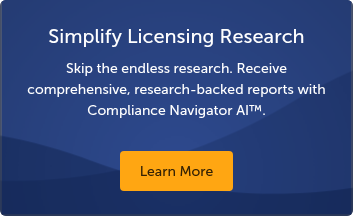
Compounding Pharmacy License
Explore compounding pharmacy license requirements in all 50 states.
Starting or Expanding a Compounding Pharmacy Firm
Compounding pharmacies are regulated at state and federal levels to protect consumers. It is essential for pharmacies to stay educated and aware of business and licensing requirements to ensure compliance and good standing. The process for starting or expanding a compounding pharmacy includes:
- Learning your state’s business registration and licensing requirements.
- Deciding on a business name and entity structure.
- Applying for a federal tax identification number from the Internal Revenue Service and registering with the Secretary of State.
- Obtaining necessary types of insurance, including general liability, commercial auto, and workers’ compensation.
- Researching license and registration renewal requirements and preparing to keep your business compliant.
If you are concerned about managing the business registration process on your own, you can seek guidance from the business licensing experts at Harbor Compliance. With our professional licensing services, we offer full support through all of the stages of the corporate life cycle and can provide access to expert software insights. We make preparing and filing applications easy and handle communication with government agencies on your behalf. With our software, you can track your registration status, license numbers, filing history, fees, and renewals 24/7.
Obtaining a Compounding Pharmacy License
Because of the serious health concerns associated with distributing drugs, pharmacy compounders are under strict watch. In most states compounding pharmacies are licensed through the jurisdiction’s Board of Pharmacy.
In addition to obtaining business licensure, most states require a designated pharmacist-in-charge. The pharmacist-in-charge must maintain a valid license in their home state and is responsible for the business’s compliance with all applicable state and federal laws. Additional licenses are required if the pharmacy has different locations or delivers drugs to patients in other states.
The type of pharmacy license you need depends on your state’s requirements and the types of activities you will complete. License types include:
- Pharmacy manufacturer license
- Pharmacy wholesaler license
- Pharmacy importer/exporter license
- Pharmacy re-packer license
- Pharmacy retailer license
In addition to the license for your business, you will also need to ensure your employees are appropriately licensed. Most states require licenses for the following positions:
- Pharmacy technician
- Registered pharmacist
- Intern pharmacist
Licensing requirements for compounding pharmacies vary by state. It is essential to verify the process in your state to ensure you are prepared every step of the way. You will likely need to gather all relevant documentation, including financial statements, proof of a commercial activity license, a business plan, and more.
In addition to licensing, you will also need to appoint a registered agent to receive notices of lawsuits and other legal or government notices. To manage those tasks more efficiently, Harbor Compliance offers a comprehensive software suite and managed services to help simplify the application process, allowing you to focus on other aspects of running your business.
Maintenance and Renewal
Most states and cities require licenses to be renewed on an annual or biennial basis. Renewal ensures your business complies with all state and local regulations. Renewal fees vary, so it is a good idea to be aware of what you may owe to keep your business in good standing.
If you are currently operating a compounding pharmacy and are looking to outsource your maintenance and renewal duties, Harbor Compliance can help. License Manager helps healthcare professionals maintain their licenses by automating repetitive tasks like tracking renewals and compliance deadlines. Through License Manager, you can also access Compliance Core™ – our extensive, proprietary database of nationwide licensing requirements – to research the requirements for the states in which you work. Contact our licensing experts today to learn more.
Explore Licensing by State
Click on a link below to view licensing information in your state.
Controlled Substance Registration - In addition to a pharmacy license, controlled substance registration registration is required in many states for pharmacies that distribute controlled substances.
NABP (National Association of Boards of Pharmacy) - Host a variety of programs and resources relating to pharmacist and pharmacy licensure and examination.
Pharmacist in Charge - A licensed pharmacist designated by a pharmacy to act as the party responsible for compliance with regulations.
VPP (Verified Pharmacy Program) - A program run by NABP that allows state boards to share information and more easily register out-of-state pharmacies.



